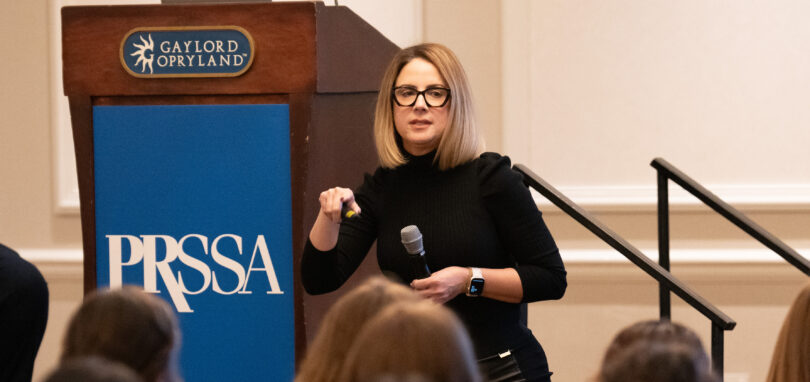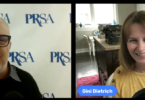In recent weeks, PRsay has posted Q&As with several thought leaders who spoke at PRSSA’s ICON 2023 at the Gaylord Opryland Resort & Convention Center in Nashville, Tenn.
With a career in law enforcement at the U.S. Department of Homeland Security, Barbara Agrait has navigated crises across the globe. Today, she is the senior PR manager of global media relations at Amazon. On Oct. 16, she shared her international perspective to students in a session titled “Diverse Roots, Universal Impact: Humanizing Reputation and Crisis Communications.”
Beforehand, Agrait talked with PRsay about crisis management.
How can communicators who are not used to it adjust to working in crisis-at-any-moment environments?
I worked for law enforcement and the Department of Homeland Security for a long time, so I am accustomed to dealing with crises — from bomb threats to airplane and freighter hijackings and unfortunately, to people washing up ashore dead.
In those situations, there’s nothing more important than remaining calm and being a voice of comfort and knowledge. That’s what people are looking for, a calming voice. They want to know what is the threat: “Is there a threat to my family, a threat to myself? Do I need to do something about it? Are other threats impending?” In those situations, again, the most important thing is to remain composed, to find out the information and work with all of the agencies or spokespeople that may be involved.
The problem that sometimes exists is conflicting information when there is a crisis. One law enforcement or government agency or spokesperson may say one thing, but then someone else contradicts that statement. And that creates panic, a level of complete fear. That’s the last thing you want to do as a communicator.
What are the most important skills for communicators today?
Responsiveness. Because the vacuum of information is a problem. When you have citizen journalists and social media, pundits and people speculating and igniting fear during a crisis, there cannot be silence from the voice of authority. Otherwise, fear is only going to perpetuate and grow. I look for communicators who are composed, confident and responsive, who can admit making mistakes and are willing to learn.
How do you respond to falsehoods, whether they’re on social media or some other platform?
Social media is its own beast. A lot of people like to give their opinions. Not inserting yourself in that kind of social media environment is the best approach. I’m not one to offer any engagement back and forth, unless I see some sort of potential risk to a community or to people’s lives. Other than that, you need to let people say what they want and let the news outlets be the voice of reason and authority.
Discuss the challenges — and the importance of — maintaining a work-life balance during a crisis.
When you are in a crisis, that’s not the time to prepare for a crisis. You should have done the legwork before. You should do trainings, mock [crisis situations] and exercises. You should know who is going to do what, when and where. You also establish rotations and duty officers. PR professionals responsible for crisis communications should make these preparations to avoid being under the pressure of having to be on 24/7, which is not sustainable, not healthy and not something that I recommend.
Here, she offers advice for maintaining composure during a crisis:
I’m overseeing Latin America and Canada in my new capacity. For me, relationship-building in these regions is critical. Because when you deal with crisis communication, you don’t want to get to know the reporter when a crisis strikes. You want to know the reporter before the crisis. As I look to 2024, I want to travel to those regions and get to know people and the reporters who cover my company.
John Elsasser is PRSA’s publications director and editor-in-chief of its award-winning publication, Strategies & Tactics. He joined PRSA in 1994.
[Photo credit: jim cowsert/grapevine photo]






